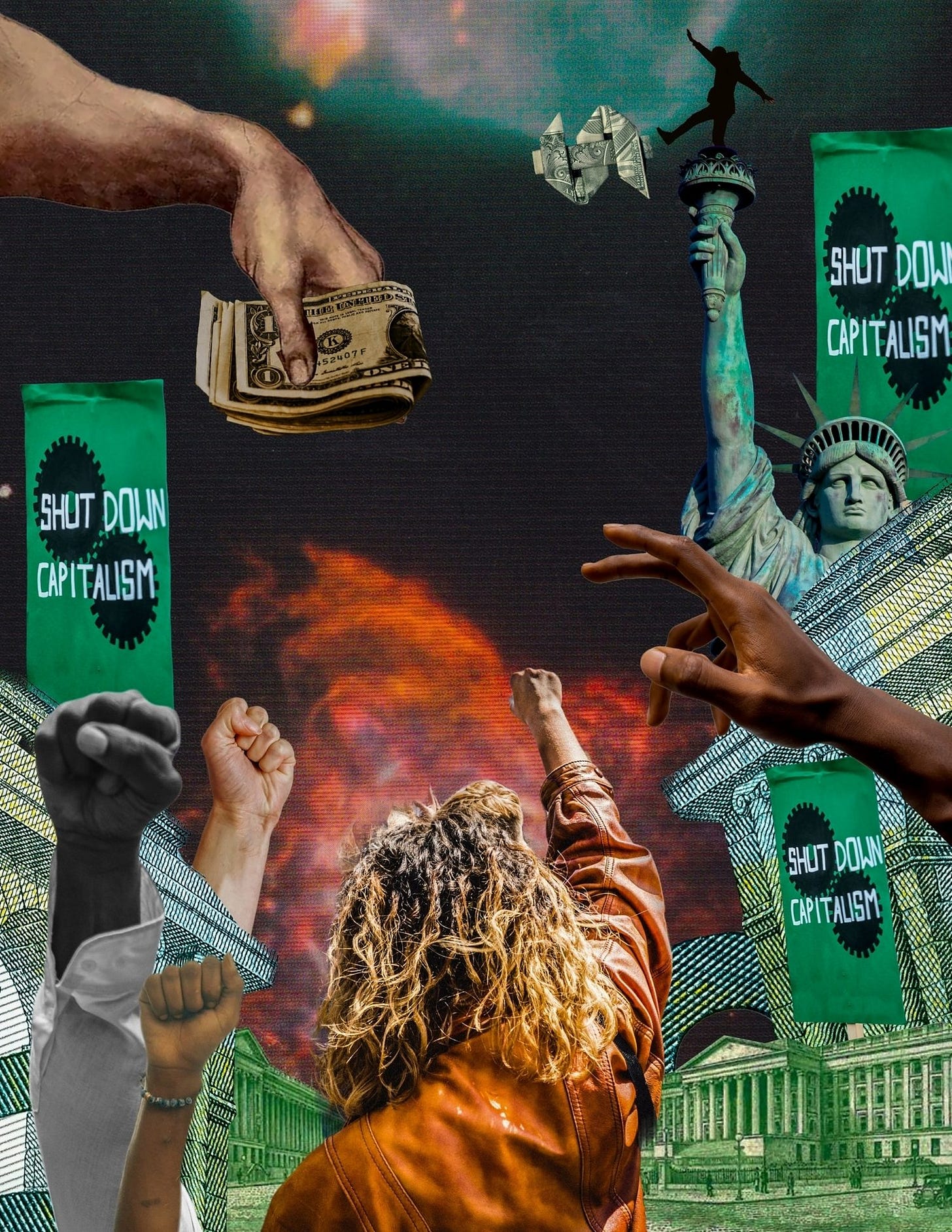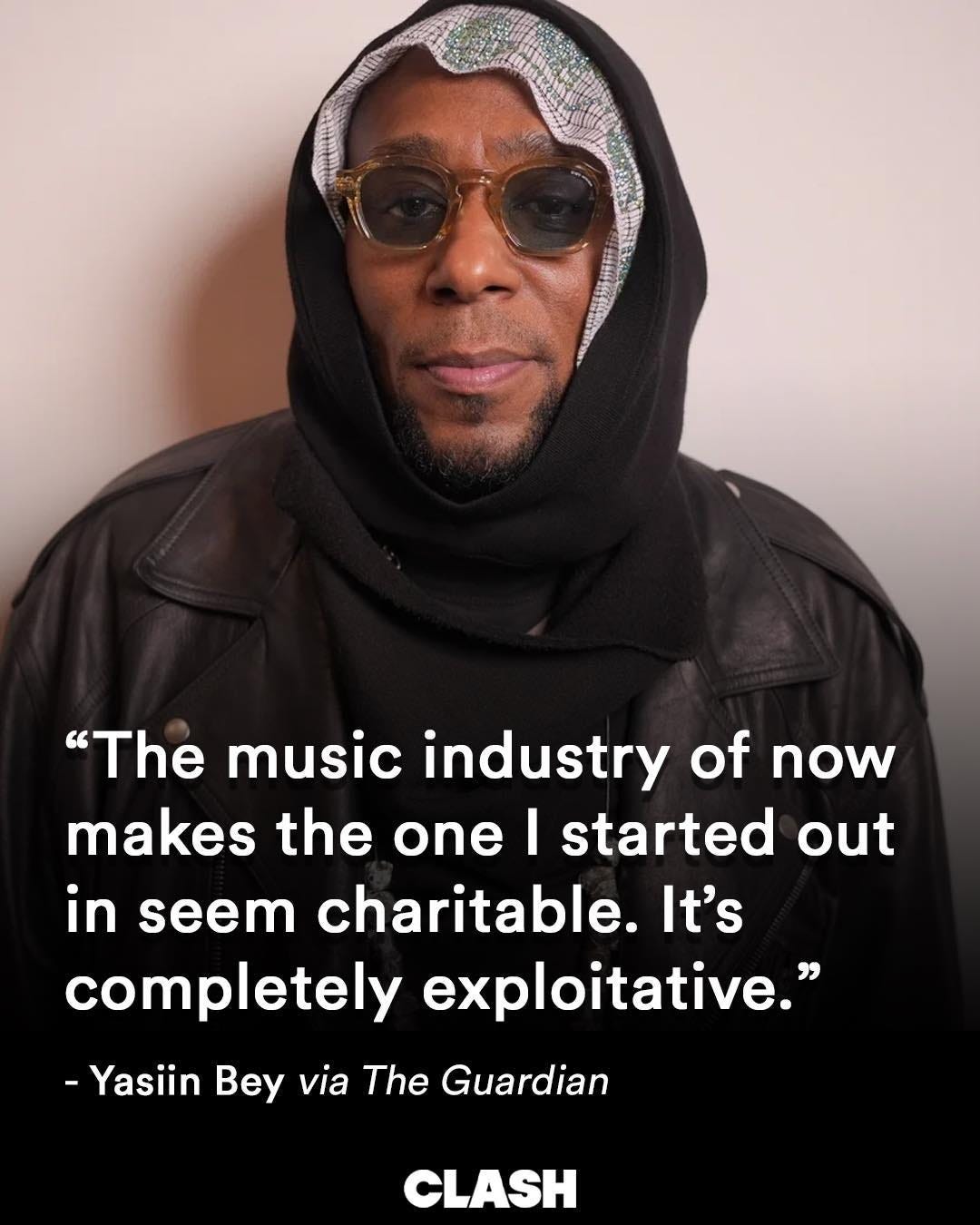The Music Industry is a Nightmare
Here's Why We Must Cultivate New Terrain
There’s been a ton of discussion around Beyoncé and Kendrick Lamar’s nationally televised performances. We forget that these musicians make money when we engage with their art, whether we’re critiquing them or singing their praises. What I haven’t heard as much talk about is the ruthless terrain working class musicians walk on, especially independent musicians who are dedicated to disturbing the peace.
For some context, I’m an artist (musician, writer, performer), an organizer, and part of the Debt Collective—the nation’s first union of debtors. I went into six figures of debt to pursue an MFA degree. I know a thing or two about the shame of being in the red, about having negative net worth. Although I’ve been involved in many movements throughout the years, what I began to uncover, about how debt functions, expanded my class consciousness and connected many of the issues I’d devoted my life to solving—from gender inequity to anti-Blackness. Debt worsens every social disparity. Unjust debts related to what should be public goods—for example, education, healthcare, or housing—are primary ways the ruling class exerts control over the working class. And what adds insult to injury is our debts are rich people’s assets. We pay the rich for what should be public goods, with interest.
People ask why we’re not hearing more music that reflects our turbulent times, particularly the billionaire coup. Meanwhile, I’d love to rage against the machine, but the machine requires me to fund my dreams, myself. I’m angry and anguished. But this is how things work. You see, most musicians in America, even the rich and famous ones, are in debt. Not only that, but the entire music industry is built upon a debt-as-control system of dominance.
Here’s a few reasons why you aren’t nodding your head to tunes that reflects the times:
1. The music does exist, but you don’t get exposed to it.
Creating a song is one thing; getting it to an audience is another. There’s an entire ecosystem—press, booking, negotiating pay, styling, and more—built around promoting artists. Now, musicians are expected to do all of it themselves. They aren’t really discovered. They are pressured to create their own following because it lowers the risk of losing profit from a musician or a song. This hits working-class artists hardest; they can’t rely on “going viral” once or twice. They need consistent support to be heard. The struggle of these independent artists is a story of resilience and determination that deserves our recognition and support.
2. Artists are routinely paid in “exposure,” which isn’t actually pay at all.
Spotify pays pennies, and visibility, exposure and a stage rarely covers rent, groceries or a car note. Creating beautiful artistic work is labor, but somehow we don’t think of it that way because sometimes artists love making their work (although the work can also be grueling and gut-wrenching too). This model of interacting with musicians favors those who already have money and connections. Being a full-time artist isn’t just about talent; it’s about resources. Musicians essentially run small businesses, and if you don’t have a financial cushion, it’s nearly impossible to start out, to sustain yourself and to write songs that disrupt the status quo. Here’s where the industry sets up the perfect conditions to milk creative people for all they’re worth.
3. A record deal is a loan—and it’s always been that way.
Here’s the bogus fairy tale: work hard until a major labor blesses you with a record deal. Key word here is deal, and it’s extremely misleading. A record deal is a loan, it is a promise to make the label’s money back, with interest. Fame is not financial security. Major labels routinely offer 360 deals that can be incredibly exploitative—owning an artist outright, their masters, their name, their entire artistic being. Even big-name artists like Megan Thee Stallion and even Beyoncé have been caught in bad deals, especially at the onset of their careers. This impacts what they write about.
Think about it. Why would a major record label run the risk of allowing an artist to diss billionaires when they can make them rap about getting money or put out another sappy love song? Not only that, but the music industry in the U.S. is rooted in Racial Capitalism, echoing sharecropping, redlining, with a special spin: the ruthless appropriation of Black creativity. Yasiin Bey recently said “the music industry of my day seems charitable compared to the music industry of today—its completely exploitative.” For context, the music industry of his heyday had groups like TLC literally storming music industry boardrooms demanding money they were owed.
So what can we do?
Join a Union Now
I’m part of the Debt Collective because I owe the federal government for the so-called crime of pursuing education. It is a debt sentence. But the federal government has the legal authority to unilaterally cancel all student debt. Biden had the power to do this but fell short. Now things will get tougher but I’m determined to organize for the abolition of household debts (which includes fighting for college for all). If you’re a musician, you could just as easily join United Musicians and Allied Workers or a Tenant Union since safe housing is such a central part of building a creative life.
Be Intentional and Supportive
Everybody loves music. Well, some people don't, which makes me very sad. However, the majority of us who either listen to songs or create our own songs can be more intentional about supporting independent music. I'm an organizer, and I must admit that it saddens me how often leftists either talk incessantly about or outright support mainstream musicians. I'll go to parties, and leftists are all playing Top 40 artists. No shade because the music is often good. I get it, discovering new music takes time, but there are plenty of playlists being created here on Substack to steer you in the right direction. How about this? For every time you mention Kendrick Lamar, mention Noname? I just did. Can we all commit to that? Let's empower ourselves to make a difference in creative industries by intentionally supporting independent artists with smaller followings. Instead of asking less known musicians when their next project is coming out, ask how I can support your next project? How have you been feeling? What's inspiring you lately? Instead of asking musicians when you can see them play, ask: do you have any live shows coming up, and if so, can I help spread the word?
Speaking of which, I’m an artist .
Liking, commenting, sharing or subscribing to my Substack will help me make more revolutionary art.
And remember, our love for one another is more powerful than all the systems conspiring against us.
In solidarity.



